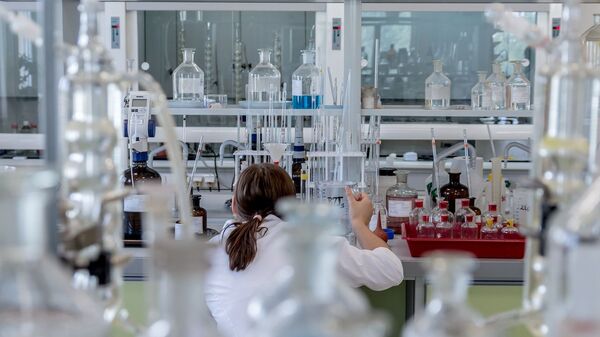Stephanie Burton, a professor in Biochemistry, Genetics and Microbiology at the University of Pretoria in South Africa, gave her views on the matter.
Sputnik: How has the coronavirus pandemic affected academic research?
Stephanie Burton: An enormous amount of research has been focused immediately on the pandemic itself, on not only the search for vaccines and treatments, but also of course on the epidemiology, the modelling, the predicting, and the social aspects of it.
What it has also done of course is to change the way that people are living, it has had a real impact on how people access their workplaces, so people are not able to go to research facilities, they are not able to travel in the same way, and they are certainly not able to interact in the same way.
Looking at what we have experienced ourselves, there has been an enormous impact on the productivity in certain aspects of research, there have been many programmes that have been closed down, and others where you simply cannot maintain the, for example, biological samples, plant collection, animal populations, and so on, so there have been some programmes that have been closed down.
Some of them have been delayed, for example, research on seasons for climate change, which have been postponed to the point where they have possibly lost a year or so of data, so there will be programmes of that sort that have been delayed.
There has been a change in the way we publish. Hitherto it has been long term and sometimes many months from the point of an article being submitted to the point where it is published, that has turned around, and people are using a different approach of not waiting for peer review, but putting so-called pre-prints onto a database, and they become open to the public, there are pros and cons to that, but that has been one of the changes.
Sputnik: Are scientists from different countries throughout the world now more willing to collaborate on projects?
Stephanie Burton: Absolutely. We have already seen that. We already know that in the search for a coronavirus vaccine and in characterising the disease, there has been some tremendous collaboration, and I think that we are seeing that continue.
There has been sharing of data, sharing of capacity, working together on how we might be dealing with other impacts of the virus, so yes I think that there has been a very positive impact on the way in which people collaborate.
There has perhaps also been a little bit less competition between groups, and a bit more cooperation.
Stephanie Burton: I have no doubt that the cooperation will help. I’m optimistic that we are talking months to a year, rather than longer, and that’s because we have got quite a lot of expertise around the world in developing vaccines.
If you read some of the publications, there are many approaches being taken, there is not only one way to make a vaccine, and I think that the other part of that is that the manufacturing side of it, as once you design a vaccine, you then need to manufacture enough of that vaccine.
We already know that there are pharma companies across the world who are putting in place facilities that would allow them to produce large amounts of vaccines quite quickly, once we know what the vaccine is, so working in parallel rather than working in succession is going to speed up that process.




